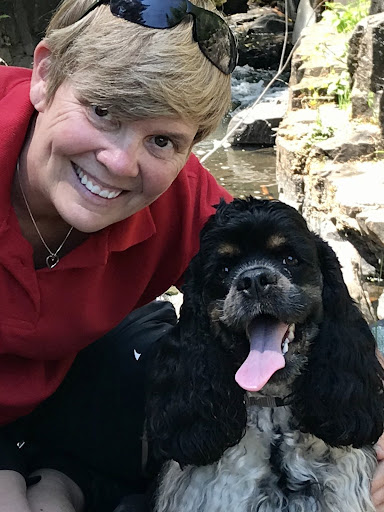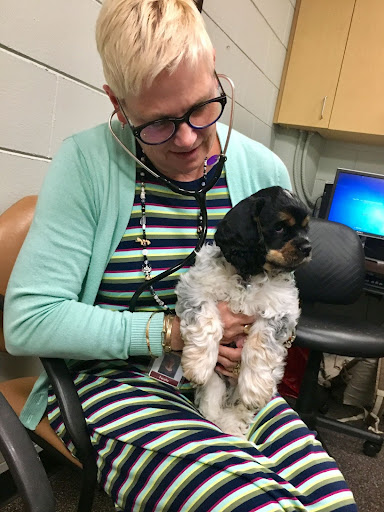Nourishing a positive outcome
Veterinary nutrition service works its magic to help a dog overcome severe stomach issues

Veterinary nutrition service works its magic to help a dog overcome severe stomach issues
HokusPokus began suffering gastrointestinal distress as a young dog, but expert care from the Veterinary Medical Center's Nutrition Service helped restore his health.
HokusPokus is a 4-year-old Cocker Spaniel of many talents. He’s mastered challenging agility courses with ease and is a certified therapy animal. He accompanies his owner, Connie Gunderson, to the social work courses she teaches and provides steady reassurance to college students in the classroom.
"We teach,” says Gunderson, an associate professor at the College of Scholastica in Duluth, Minn. “I know students graduate because of him and the comfort his presence provides.”
Gunderson welcomed HokusPokus into her home when he was just a few months old. Committed to giving him a long and healthy life, she scheduled a new puppy nutrition consultation with Dr. Julie Churchill, a board-certified nutritionist at the Veterinary Medical Center (VMC) at the University of Minnesota (UMN) College of Veterinary Medicine (CVM).

At the consult, Churchill worked with Gunderson to optimize healthy growth for her pup through nutritious and balanced puppy food. HokusPokus was set to return to the hospital when he was 9 to 12 months old to adapt his nutrition plan for his transition into adulthood.
Though initially healthy and active, HokusPokus started showing signs of stomach upset. Gunderson reported he lost his enthusiasm for eating and suffered bouts of diarrhea and vomiting. She brought HokusPokus to their local veterinarian, who sent them home with a prescription diet and several medications that temporarily improved his condition.
Over time, Gunderson noticed HokusPokus again developed stomach or gastrointestinal (GI) distress. Less energetic than usual and frequently lying in pain, he had recurrent bloody diarrhea and vomiting. This time, in consensus with her local veterinarian, Gunderson returned to the VMC for additional guidance from Churchill.

Citing scientific studies identifying a potential risk for heart disease, Churchill recommended changing from a grain-free diet to a specially formulated, highly digestible diet that would be easier on HokusPokus’ stomach and still meet his nutritional needs for growth. Churchill also incorporated a nutrition supplement to support his GI and whole-body immune system.
Under Churchill’s guidance, HokusPokus’ stomach issues were better managed. As if by magic, he no longer showed signs of GI distress.
“While medication is often one piece of the puzzle,” Churchill says, “owners may obtain a lot of relief for their pets by changing the diet to a prescription diet designed to alleviate the patient’s clinical signs. In this case, we initially chose a digestible diet to address vomiting and diarrhea.”
Stomach or digestive issues frequently appear at or near the top of the list of reasons pets receive veterinary care. Challenging for veterinarians and owners alike, determining the source of a stomach problem like the one Hokus Pokus experienced may be a process of elimination.
Owners and veterinarians must decide if the pet ate something it shouldn’t have or, perhaps, has an illness caused by a bacteria or a virus. Sometimes, an underlying disease process causes digestive issues. Whatever the cause, a nutrition consult can prove invaluable in managing the problem.

HokusPokus’ case isn’t the first impactful experience Gunderson has had with the VMC Nutrition Service. She first benefited from Churchill's expertise back in December 2016. At that time, Gunderson saw Churchill when her dog, Franklin, was diagnosed with cancer and later kidney disease. Franklin’s estimated life expectancy was just four to five weeks. When Gunderson asked what more could be done to support Franklin, clinicians recommended she meet with Churchill. Coordinating nutritional care and other medical services, Churchill helped extend Franklin’s life by more than three years.
“I’m immensely grateful, happy, relieved, and deeply touched by the care HokusPokus and Franklin received from Dr. Churchill and her team,” Gunderson explains, “I respect Dr. Churchill's breadth and depth of knowledge and skill along with her empathy, compassion, and care.”
Did you know you can make a tax-deductible gift to support the Veterinary Medical Center Nutrition Service Fund? Donate online here, or contact VMC Development Officer Will Haugen at hauge442@umn.edu or 612-625-7714 for more information. Gifts in any amount help our clinicians treat more animals with leading healthcare and train the next generation of veterinarians.